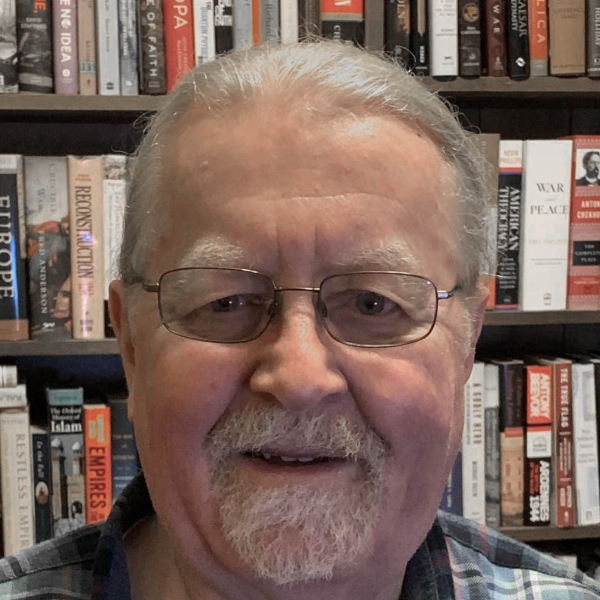
Q&A with history alumnus Tom Dietz
Tom Dietz is proof that a history degree can open many doors – even those that you least expect. Dietz earned his bachelor’s and master’s degree in history from WSU and later went on to serve as the curator for the Kalamazoo Valley Museum for nearly 22 years.
While he never intended on a career as a museum curator, Dietz is extremely proud of the Kalamazoo Valley Museum’s role in the revitalization of the city. “At the time I took the position, the city was in an economic downturn and financial crisis. The museum was one of the institutions that were being built to contribute to the growth. I got to witness and contribute towards bettering the city and the lives of the citizens of Kalamazoo. During the tough economic times, the people of Kalamazoo would find entertainment and enjoyment from going to the museum. We never charged admission, so it was a fun, safe and affordable educational activity for all.” Here Dietz shares more about his love of history and advice for current students.
Why did you choose to study history?
Like many young students, I wasn’t sure what I wanted to do or study when I started university. I attended a Catholic seminary in Southfield but decided not to become a priest. After enrolling at Wayne State in 1970, I chose history as my major. I quickly developed a passion for the subject. I always enjoyed learning about history growing up. I remember reading history books in my youth. My true love for history developed when I started at Wayne State. I also came to love the city of Detroit and its history, so Wayne State was a perfect fit for me.
How did you decide to pursue a graduate degree in history?
My history advisor encouraged me to pursue my master’s degree. He was incredible. I still stay in touch with him to this day. He advised me throughout my entire Wayne State experience. The history program at WSU was and is still a tremendous program. I highly recommend the public history program to everyone who is thinking of pursuing a degree in history.
How has Wayne State and the history program contributed to your success?
I served as the curator of urban history at the Detroit Historical Museum from 1984 until 1992. In those days, the position was a civil service position for the City of Detroit. The application process included taking a civil servant exam since the museum was city-owned. I scored very well, was placed on a civil service list, and later landed the position. My background in the WSU history department was very helpful. Studying American history enhanced my knowledge and challenged the way I think about the world. Broad knowledge of history allowed me to look at local stories and place them in a national context.
What do you consider to be your biggest academic or professional achievement?
In 1984, I returned to Detroit after several weeks of research in the National Archives. I found a message from one of my professors telling me to contact the Detroit Historical Museum about a position that opened. As I mentioned, I had taken the civil service exam several years previously, and I had been placed on the list of qualified candidates. When the museum had an open position, I was on that list and was hired. I started my museum career as curator of urban history.
In 1992, during a financial downturn, I was laid off but found a new job at the Kalamazoo Valley Museum as curator of local history. At the time, the museum was building a new larger facility and I was fortunate enough to be involved from the very beginning in developing the new history galleries. The museum was part of an effort to revive the downtown area.
It proved to be an effective attraction, drawing visitors from across the region. Together with other developments in those years, downtown Kalamazoo has been revitalized and I feel my greatest achievement was to have been a part of this successful effort. I would not have been able to have been a part of this without the excellent background I received in Wayne State’s history department. I retired from the museum after 22 years.
Why is having a history degree so beneficial?
I encourage everyone to take a history course during their undergraduate career. I am a firm believer in the value of the liberal arts. They provide a broad background that enables a person to adapt to changing life and career circumstances. I truly believe that I was able to make a successful career in public history because as life presented me with various and even unexpected challenges, I had a foundation that allowed me to adjust. As a profession, history needs a greater diversity particularly in terms of women and people of color.
What advice would give to someone who wants to pursue a degree in history?
Do what you love! If you are passionate about the field that you are in, it will be much easier to find a job that you will succeed with. The field is constantly changing, so remember to always be flexible and adaptable to whatever comes your way. There are so many unique and different jobs in the field of history.
You can practice public history, particularly local history, in many ways. A museum career may be the most obvious but even that requires various skills from curation and care of collections to exhibit research and development. Writing for historical magazines, public talks, and using social media are all ways in which to involve your community in learning about its past.